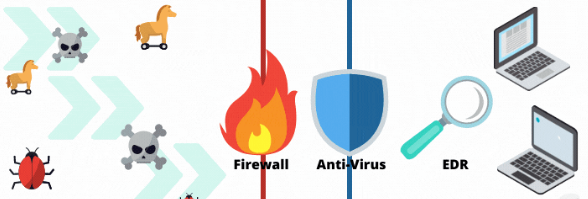When picking essential security tools for your organization, you come across plenty of options. The two most common cyber security solutions are firewalls and EDR. Since you want to make a smart investment, you don't want to get all security options. It's when you wonder if is EDR a firewall.
Or should I get both or one of them? If that's what is in your mind, it's time to know whether EDR is a Firewall or not. And if it's not the firewalls, what's the main difference between both options? Let's continue reading and exploring every bit of it.

What is an EDR?
EDR Stands for Endpoint Detection and Response. The software monitors endpoints in real-time to detect and respond to threats. It can detect malicious files and activities across the network.
What is a Firewall?
On the other hand, a firewall is a type of security tool that acts as a barrier between a trusted internet network and an untrusted external network. It protects your business network against malware and other cyber threats by completely controlling incoming and outgoing traffic.
It prevents unauthorized access to your business network while permitting legitimate traffic such as email messages and web browsing requests.
Your organization needs a firewall because 90% of Network attacks are defeated successfully by Firewalls.
No, EDR is not a Firewall. It's an advanced-level security tool with firewall capabilities, but it performs many other functions to secure your organization against known and unknown malware attacks.
What are the Differences Between EDR and Firewall?
Here are some points that make a clear difference between both security options.
Security Coverage
EDR is a security tool that prevents attacks on your endpoints. It won't let any authorized users access your endpoints. It monitors endpoints continuously, and if a threat actor tries to access any endpoint or your system, it quickly blocks this access.
On the flip side, your company can secure its whole network through Firewalls. It's not wrong to say that firewalls offer more comprehensive security. EDR only protects endpoints, while Firewalls will provide optimal security coverage across your network.
Security Approach
Another difference between Firewalls and EDR is their security approach. A Firewall blocks unwanted traffic and won't let unauthorized users access your network. EDR monitors traffic across all endpoints with the sole purpose of identifying and preventing potential threats. EDR is better than a firewall because it detects malicious activity before it causes any damage.
Defence Mechanism
Another difference between firewalls and EDR is their defense mechanism. A firewall is reactive when dealing with threat actors. If a firewall detects any suspicious activity or traffic, the software will readily block it.
EDR is reactive plus proactive. It helps you prevent threats across your endpoints. Whenever there is some unusual activity or behavior on your endpoints, then it will stop and block the access. This software continuously monitors your endpoints to identify threats before they can cause any damage.
An EDR Solution may Include a Firewall
An endpoint detection and response system is quite an effective tool to protect your endpoints against cyber threats. Xcitium EDR is a comprehensive security tool that comprises multiple security technologies such as antivirus, whitelisting tools, or monitoring tools. You would be surprised to know that EDR often includes a Firewall. This detection system needs a firewall to block and filter trusted traffic from untrusted ones on all your endpoints.
EDR vs Firewall - What Your Organization Needs?
Finally, you have got a clear picture of EDR and Antivirus. You get a detailed answer to the question: "Is EDR a firewall?". Well, not an EDR is not a firewall, but it includes firewalls and some other security tools.
Another question to address here is whether your organization needs one or two solutions. The answer is you need both. Regardless of your business's scale, Endpoint detection and response tools are super effective in preventing threats across endpoints.
According to Expert insights, 32% of cybercriminals try to steal business data by getting unauthorized access to remote devices.
You must protect these remote devices or endpoints to ensure no threat actor can access your system.
However, EDR alone isn't effective. It would be best if you tightened all the loose ends where your business is vulnerable. It's where Firewall comes into play. This security tool will help you secure your business network as a whole. Once a robust firewall is installed, you block unauthorized access to your system.
Key Takeaways
Question: Is EDR a Firewall?
Answer: No, EDR isn't a Firewall, but it may contain a firewall.
Your organization needs both security solutions to create comprehensive protection from cyber threats. EDR detect malicious behavior on endpoints, while a Firewall prevents malware from entering your network in the first place. A security expert adds both tools to the overall security strategy.
Are you looking for the most reliable EDR tool to protect your organization's Endpoints? Consider getting Xcitium EDR. It will make your security team efficient and more productive than before while letting you create a strong defence against threat actors.
